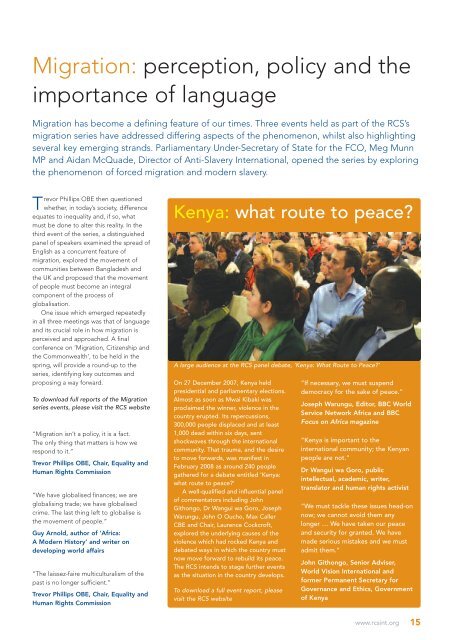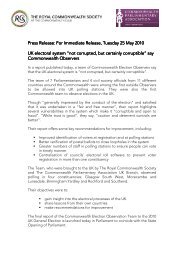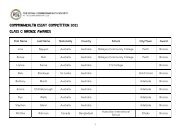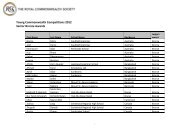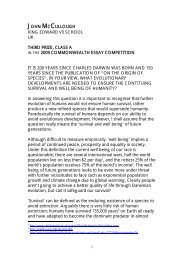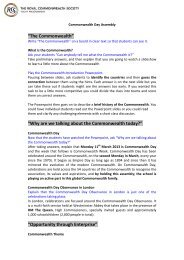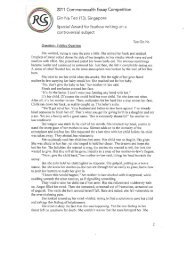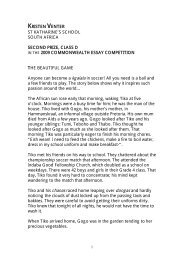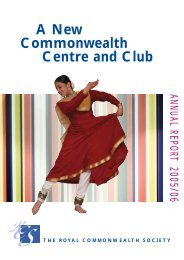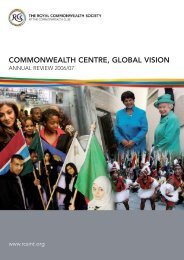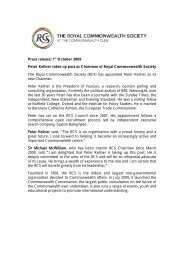Annual Review 2007-2008 - The Royal Commonwealth Society
Annual Review 2007-2008 - The Royal Commonwealth Society
Annual Review 2007-2008 - The Royal Commonwealth Society
You also want an ePaper? Increase the reach of your titles
YUMPU automatically turns print PDFs into web optimized ePapers that Google loves.
Migration: perception, policy and the<br />
importance of language<br />
Migration has become a defining feature of our times. Three events held as part of the RCS’s<br />
migration series have addressed differing aspects of the phenomenon, whilst also highlighting<br />
several key emerging strands. Parliamentary Under-Secretary of State for the FCO, Meg Munn<br />
MP and Aidan McQuade, Director of Anti-Slavery International, opened the series by exploring<br />
the phenomenon of forced migration and modern slavery.<br />
Trevor Phillips OBE then questioned<br />
whether, in today’s society, difference<br />
equates to inequality and, if so, what<br />
must be done to alter this reality. In the<br />
third event of the series, a distinguished<br />
panel of speakers examined the spread of<br />
English as a concurrent feature of<br />
migration, explored the movement of<br />
communities between Bangladesh and<br />
the UK and proposed that the movement<br />
of people must become an integral<br />
component of the process of<br />
globalisation.<br />
One issue which emerged repeatedly<br />
in all three meetings was that of language<br />
and its crucial role in how migration is<br />
perceived and approached. A final<br />
conference on ‘Migration, Citizenship and<br />
the <strong>Commonwealth</strong>’, to be held in the<br />
spring, will provide a round-up to the<br />
series, identifying key outcomes and<br />
proposing a way forward.<br />
To download full reports of the Migration<br />
series events, please visit the RCS website<br />
“Migration isn’t a policy, it is a fact.<br />
<strong>The</strong> only thing that matters is how we<br />
respond to it.”<br />
Trevor Phillips OBE, Chair, Equality and<br />
Human Rights Commission<br />
“We have globalised finances; we are<br />
globalising trade; we have globalised<br />
crime. <strong>The</strong> last thing left to globalise is<br />
the movement of people.”<br />
Guy Arnold, author of ‘Africa:<br />
A Modern History’ and writer on<br />
developing world affairs<br />
“<strong>The</strong> laissez-faire multiculturalism of the<br />
past is no longer sufficient.”<br />
Trevor Phillips OBE, Chair, Equality and<br />
Human Rights Commission<br />
Kenya: what route to peace?<br />
A large audience at the RCS panel debate, ‘Kenya: What Route to Peace?’<br />
On 27 December <strong>2007</strong>, Kenya held<br />
presidential and parliamentary elections.<br />
Almost as soon as Mwai Kibaki was<br />
proclaimed the winner, violence in the<br />
country erupted. Its repercussions,<br />
300,000 people displaced and at least<br />
1,000 dead within six days, sent<br />
shockwaves through the international<br />
community. That trauma, and the desire<br />
to move forwards, was manifest in<br />
February <strong>2008</strong> as around 240 people<br />
gathered for a debate entitled ‘Kenya:<br />
what route to peace?’<br />
A well-qualified and influential panel<br />
of commentators including John<br />
Githongo, Dr Wangui wa Goro, Joseph<br />
Warungu, John O Oucho, Max Caller<br />
CBE and Chair, Laurence Cockcroft,<br />
explored the underlying causes of the<br />
violence which had rocked Kenya and<br />
debated ways in which the country must<br />
now move forward to rebuild its peace.<br />
<strong>The</strong> RCS intends to stage further events<br />
as the situation in the country develops.<br />
To download a full event report, please<br />
visit the RCS website<br />
“If necessary, we must suspend<br />
democracy for the sake of peace.”<br />
Joseph Warungu, Editor, BBC World<br />
Service Network Africa and BBC<br />
Focus on Africa magazine<br />
“Kenya is important to the<br />
international community; the Kenyan<br />
people are not.”<br />
Dr Wangui wa Goro, public<br />
intellectual, academic, writer,<br />
translator and human rights activist<br />
“We must tackle these issues head-on<br />
now; we cannot avoid them any<br />
longer … We have taken our peace<br />
and security for granted. We have<br />
made serious mistakes and we must<br />
admit them.”<br />
John Githongo, Senior Adviser,<br />
World Vision International and<br />
former Permanent Secretary for<br />
Governance and Ethics, Government<br />
of Kenya<br />
www.rcsint.org<br />
15


